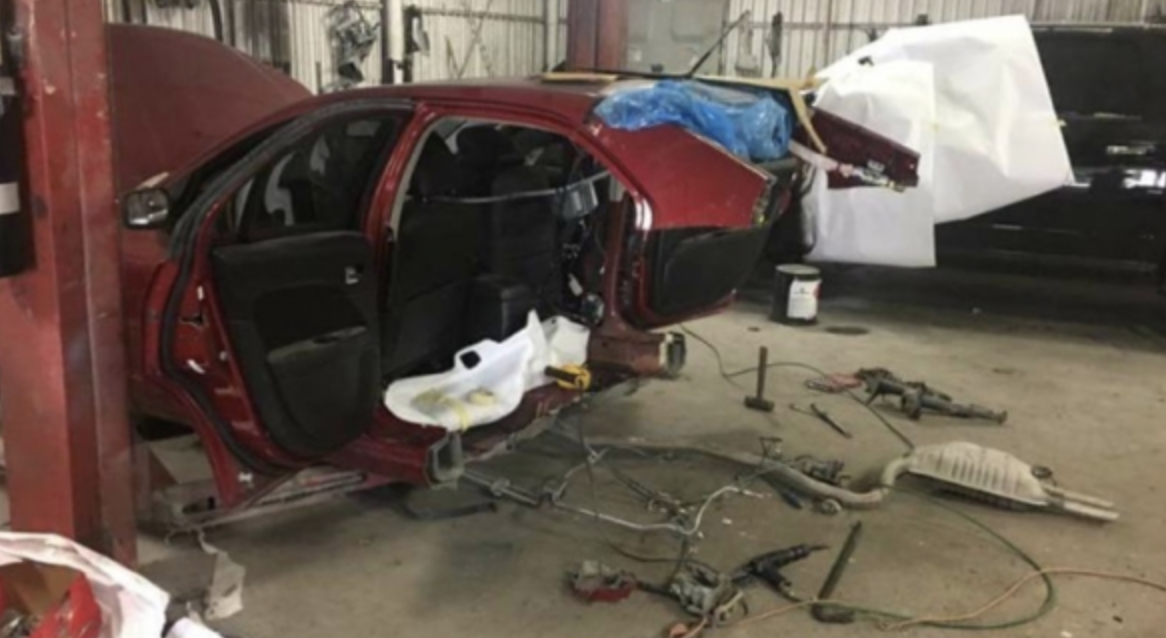If you receive an auto body repair estimate any time soon, an accurate one can contain as many as 4,000 lines. They are no longer generic like the simple listing of “remove, repair, replace, paint estimates of a decade ago. To add to the confusion, if you are getting multiple estimates and comparing from a high quality auto body shop like Streamline Auto Body versus a national auto body shop chain like a Caliber Collision or a Gerber you have to decipher why the differ. Typically these national chain collision repair shops only do the minimum amount of work required to make a panel straight and shiny and do it as fast as possible where your local shop will have more line items indicating a more detailed repair.
One common confusing item on estimates for many people is the difference between “sectioning” and “partial part replacement”.
Sectioning used to be a very common practice where an entire section of a damaged car was cut out and a new section from another car was welded in. As an example, if your car had rear bumper damage, it was usually faster to slice and remove the back half of the car and weld in a used section from a junk yard car.
At Streamline Auto Body we are appalled that repair shops perform this practice and is part of the norm. It is a practice that should be outlawed because it is extremely unsafe and puts everyone that ever rides in that car again at risk.
However sectioning has evolved and means something different if you see it on your estimate. Since we follow OEM procedures, we know that some of the manufacturer’s repair protocols require sectioning as part of a repair and they may also call for partial part replacement.
Factory seams are where two parts or two panels are welded together during vehicle assembly using spot welds, rivets, fillet welds, etc. When these areas become damaged in a collision they have to be removed and replaced somehow.

Partial part replacement is defined as replacing a part at a factory seam. This means the repair shop must remove the original attachment method to disassemble an assembly at a factory seam. When complete, the factory seam sealer is removed, replaced, and new welding is done to the panel. Many portions of your car are made of many different metals like steel or aluminum and they all react differently when heat is applied (welding). When a partial part replacement is called for by the OEM, that indicates it is safe to weld the new panel together at the factory seam, or join the two together with rivets or other boding methods as dictated by the manufacturer.

Sectioning is defined as the practice of cutting the affected area of a part out and replacing the damaged portion. We would like to point out that this does not happen at the factory seam and could even be halfway down the part. This sectioning location is pre-determined by the manufacturer’s procedures. Sometimes the vehicle maker will offer a few different sectioning locations for the same part.
When sectioning a part, the technician will cut “section” out of the part, containing the damage. It is important to note that this process will create a new repair joint, and a seam that the car did not come with originally. Most likely you will not see this seam as it will be covered by the outer body panels.
By doing this, it does not mean that your car is no longer safe to drive after the repair. Quite the opposite, if we are doing any sectioning on your vehicle, it is only because the OEM manufacturer tells us that we need to do this in order to properly repair their vehicles. At Streamline Auto Body we dedicate hours to looking up and researching the manufacturer procedures, and we also document the repair in detail.
Before starting any repair on your car we always do what we call a destructive weld test. This is done to ensure that our welder is correctly set up to perform welding on your specific make and model vehicle. Not every body shop in Little Egg Harbor Twp will do this test which is why we are confident in saying that you won’t get a more factory correct repair in New Jersey than you will right here at Streamline Auto Body.




[…] are sectioning procedures available for the outer uniside, uniside reinforcement and inner uniside parts on the 2019 […]
sildenafil 88
What's The Difference Between Sectioning And Partial Replacement On My New Jersey Auto Body Estimate? – Streamline Auto Body
college essay editing services
What's The Difference Between Sectioning And Partial Replacement On My New Jersey Auto Body Estimate? – Streamline Auto Body